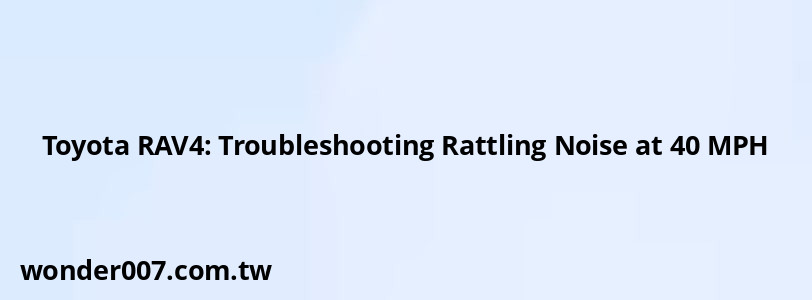Toyota RAV4: Troubleshooting Rattling Noise at 40 MPH

Experiencing a rattling noise in your Toyota RAV4 when driving at around 40 mph can be concerning. This issue is often reported by owners and can stem from various mechanical problems. Understanding the potential causes and solutions is essential for addressing this noise effectively.
Common Causes of Rattling Noise
Several factors could contribute to the rattling noise you hear at 40 mph:
- Transmission Issues: A common cause is related to the transmission, particularly a loose wave plate that may rattle at specific speeds. Mechanics often suggest that this issue is annoying but not harmful to the vehicle.
- Wheel Bearings: Worn or damaged wheel bearings can produce a grinding or rattling sound, especially noticeable when accelerating or decelerating.
- Heat Shields: Loose or damaged heat shields can create rattling noises, particularly when the vehicle is in motion. These components protect other parts of the car from excessive heat.
- Differential Problems: Issues with the rear differential can also lead to a growling or rattling noise during acceleration. Some owners have found that shifting gears (from "D" to "3") alleviates the noise temporarily.
- Tires and Alignment: Uneven tire wear or misalignment can cause vibrations and noises at certain speeds. Ensuring that tires are properly inflated and aligned can help mitigate these issues.
Steps to Diagnose the Issue
To effectively diagnose the rattling noise in your RAV4, consider the following steps:
1. Check Transmission Fluid: Ensure that the transmission fluid is at the correct level, as low fluid can lead to transmission-related noises.
2. Inspect Wheel Bearings: Have a mechanic check for worn wheel bearings, which may need replacement if they are faulty.
3. Examine Heat Shields: Look for any loose or damaged heat shields that might be causing the noise and have them secured or replaced if necessary.
4. Assess Tire Condition: Inspect your tires for uneven wear patterns and ensure they are properly balanced and aligned.
5. Consult with a Mechanic: If the problem persists after your checks, it may be wise to consult a professional mechanic who specializes in Toyota vehicles.
Temporary Solutions
While waiting for a permanent fix, some owners have found temporary relief by:
- Shifting from "D" (Drive) to "3" (Third Gear) when experiencing the noise, which can often stop it without affecting driving performance significantly.
- Regularly checking and tightening any loose components that might contribute to rattling sounds.
Conclusion
Addressing a rattling noise in your Toyota RAV4 at 40 mph requires careful diagnosis of potential mechanical issues. By identifying common causes such as transmission problems, wheel bearings, or heat shields, you can take appropriate steps to resolve the issue. If necessary, do not hesitate to seek assistance from a qualified mechanic to ensure your vehicle remains safe and reliable on the road.
Related Posts
-
2007 Toyota Camry: A/C Relay Location and Guide
27-01-2025 • 194 views -
JLG Warning Light Troubleshooting Guide
26-01-2025 • 340 views -
Chevy Silverado: Troubleshooting No Power Issues
29-01-2025 • 264 views -
Hyundai Santa Fe Navigation System Problems: Troubleshooting Guide
28-01-2025 • 396 views -
2004 Chevy Tahoe Blend Door Actuator: Troubleshooting and Replacement Guide
30-01-2025 • 244 views
Latest Posts
-
Rear Brake Caliper Piston Won't Compress
01-02-2025 • 407 views -
How To Turn Off Paddle Shifters Mercedes
01-02-2025 • 436 views -
Are O2 Sensors Covered Under Warranty
01-02-2025 • 425 views -
Power Steering Fluid Leak On Passenger Side
01-02-2025 • 510 views -
2015 Chevy Traverse AC Recharge Port Location
01-02-2025 • 466 views
Popular Posts
-
EPC Light: Understanding Causes and Solutions
26-01-2025 • 1134 views -
Hino Warning Lights: Understanding Dashboard Alerts
26-01-2025 • 932 views -
Power Steering and ABS Light On: Causes and Solutions
27-01-2025 • 696 views -
Toyota Hiace: Fuel Efficiency Insights for 2025
26-01-2025 • 769 views -
V12 Engine Costs: What You Need to Know
26-01-2025 • 752 views
